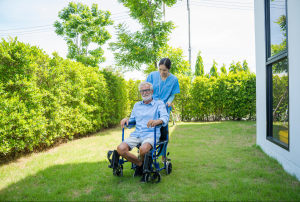A recent quantitative review has found that many older adults, especially those living in aged care facilities and residential aged care facilities, are experiencing persistent pain. Older patients with chronic pain require specialist care and medication management. This article defines chronic pain, outlines the problematic correlation between pain and dementia, and suggests strategies to improve pain management in older persons.
Defining chronic pain
A person experiencing consistent severe or extreme pain, for three months or longer than expected, is likely to be diagnosed as having chronic pain.
Pain intensity can be measured on the observational behaviour scales, or through a numerical rating scale, when a patient is asked to rate pain from zero to ten.
The verbal description scale uses descriptive language to help patients explain pain levels as:
no pain
slight pain/ bothersome pain
mild pain
moderate pain
severe pain
extreme pain
the most intense pain imaginable
There are many reasons why chronic pain can occur, including after an injury, fall or surgery. Chronic pain is often caused by an underlying medical condition or illness.
Experiences of pain in older patients
A study by the investigative program Four Corners found that there is a lack of awareness and support for older patients with chronic pain. The study found that older people, particularly aged care residents, are not receiving adequate pain management. In many cases, chronic pain is being either poorly managed, or not treated at all. This means that older people living in aged care facilities are not receiving the standard of care that they should.
Chronic pain in people with dementia
The study also found that up to 80% of aged care residents experience chronic pain. This statistic is worrying in itself; however, even more concerning is the fact that more than half of all residents in aged care in Australia have dementia, and more than two-thirds require support to manage their behavior.
These statistics combined indicate that there is a high likelihood that there many aged care residents who are in pain but who are unable to effectively communicate about their pain severity. Evidence has also suggested that people with dementia and persistent pain are at a greater risk of:
loss of coordination
more extreme memory changes
more challenging behaviour changes
changes in personality
falls
experiencing agitation and aggression
Effective pain management for people with dementia
People with advanced dementia and other cognitive impairment conditions are more likely to have communication deficits. They may not be able to use words, gestures or facial expressions to convey their intended messages. This can make it very hard for patients with dementia to self report pain.
There have been only a few studies with limited evidence on this topic to date. One important piece of externally peer reviewed research has been published in the European Journal of Pain. The study has recommended a stepped pharmacological treatment approach to reducing pain people in people with dementia. The study outlines the Stepwise pain management protocols.
In practice, this means tailoring medication plans to the individual and adapting treatment goals in light of changing needs and the level of pain experienced. This evidence based approach enabled good progress in addressing the pain experience of aged care residents with cognitive impairment.
Persistent pain and mental health
Chronic and extreme pain can significantly impact a person’s quality of life, mental health and overall well being. No one should have to live with persistent pain or in a state of chronic pain.
There is an increased risk of depression, anxiety and social isolation for people experiencing chronic pain. People with dementia are at particular risk.
Cognitive and behavioural treatment for chronic pain
Anther recent strategy for pain management is the use of cognitive and behavioural treatments and therapies. Cognitive and behaviour therapies (CBT) are based on the idea a change in thinking can impact the everyday experience .
When used to treat choric pain, CBT helps a patient learn new strategies to shift their focus away from the pain and adopt a different perspective about pain management. It can help an older person recognise a triggering pain symptom and modify negative beliefs and behaviour associated with the pain.
CBT for older patients
There is limited evidence about the use of CBT in older people with pain who live in residential aged care facilities.
One clinical review study has noted that patients reported a lower pain intensity when combining CBT, yoga and breathing exercises. They also reported better sleep and an improved capacity to carry out tasks associated with daily living. However, they did not reduce their opioid pain medication, meaning further investigation and peer review are required to determine overall outcomes
Pain management strategies for complete pain relief
A proactive approach to pain management is required for people living in residential aged care facilities. Options for an older patient experiencing chronic pain include:
pain assessment and physical examination by a specialist pain clinician
a stepped pain management care plan
a comprehensive pharmacological management plan indicating medications to be used, including opioid analgesics
Pain management responsibilities for aged care providers
Aged care service providers, and in particular, the operators of nursing homes and residential aged care facilities, are urged to put strategies in place to ensure pain relief options are available. Facility operators should offer pain management services are part of their core business, and commit to providing effective pain management in aged care. This can be done by developing cohesive policies, practices and procedures.
Pain management in nursing home and residential care settings
Other strategies nursing home operators and aged facilities should consider include:
regular systematic review of medication management strategies
implementing a comprehensive pain assessment tool, a self-report pain scale and observations pain sales, so that staff can have a common understanding about severe pain symptoms
appropriate staff training and ongoing education programs about chronic pain management
creating patient pain care plans
completing a risk assessment to respond to risk factors in the facility
taking a proactive approach by offering exercise interventions
Pain management guidelines and resources for aged care providers
The Pain Management Guide Toolkit for Aged Care, 2nd Edition (also known as the PMG toolkit, available here) is a free resource for aged care providers. The resource has been developed with input from the Australian Pain Society. The toolkit was funded by the Department of Health (Australian Government), from the Dementia and Aged Care Services Fund.
Aged care providers and residential aged care facilities should access and use this helpful resource.
Welcome to Nursed Care
Welcome to Nursed Care, a fully accredited nursing and community support service in Sydney.
We offer cohesive medical, nursing and home care support, including private nursing services. Our fully qualified registered nurses have undergone a thorough recruitment and training process. Our nursing team includes nurses from a diverse range of backgrounds and cultures, but they all have one thing in common when it comes to pain. Each of our staff members commits to helping alleviate the pain experience and improving patient outcomes.
Nursed Care for medical care and pain management at home
Our nursing staff have a detailed and clear understanding of the implications of persistent pain. They can discuss and help you with:
effective pain management
pain assessment
pain management
pain medications
pain related interference
pharmacological management of chronic pain
Nursed Care for effective aged care pain management strategies
As a result of robust training and their commitment to quality aged care, all of our nurses will provide responsive care to your pain. Our nurses can help people with a wide range of health issues, diseases and chronic pain conditions including:
musculoskeletal pain
neuropathic pain and associated neuropathic symptoms (Neuropathic pain is a type of pain that occurs when the nerves inside the body are damaged or faulty)
chronic inflammatory diseases
cancer
wounds and injuries, including pressure sores
muscle spasms
pain caused by rheumatoid arthritis
hip or knee osteoarthritis and osteoporosis
We understand the numerous reasons why pain occurs, and support a number of clients who experience pain as a result of conditions such as diabetes and heart disease, as well as people who experience pain as a result of treatments such as dialysis or chemotherapy.
Contact us to learn more.
Related Questions
Older people may find that some degree of physical activity can help reduce pain. Ideas for activities to reduce pain and maintain good physical function in older adults include:
chair based exercises
gentle stretches
yoga
tai chi
Many residential aged care facilities offer physical activity activities like these. Read our recent blog on the importance of mental health support in aged care.
You should always seek the advice of your general practitioner or consulting a pain physician about the right medications for your personal situation. A pain assessment should be conducted and a medication plan developed.
Drugs commonly used to treat chronic pain in older persons include:
paracetamol or aspirin
non-steroidal anti-inflammatory drugs (NSAIDs)
antidepressants
anticonvulsants/antiepileptics
If these drugs do not resolve pain, sometimes opioid medications will be prescribed. Opioids include:
codeine
fentanyl
hydromorphone
methadone
morphine
oxycodone
tapentadol
tramadol
There may be unwanted side effects associated with the use of opioids, with different reactions noticed among people with age differences. Opioid side effects limit overall suitability for their use by older adults and competing interests for their use must be considered.






